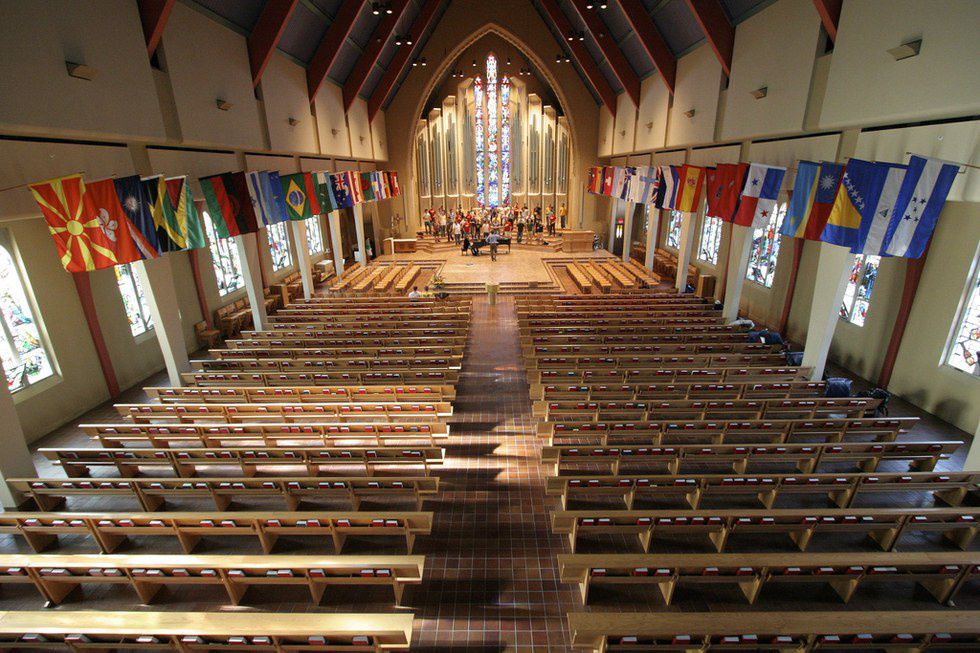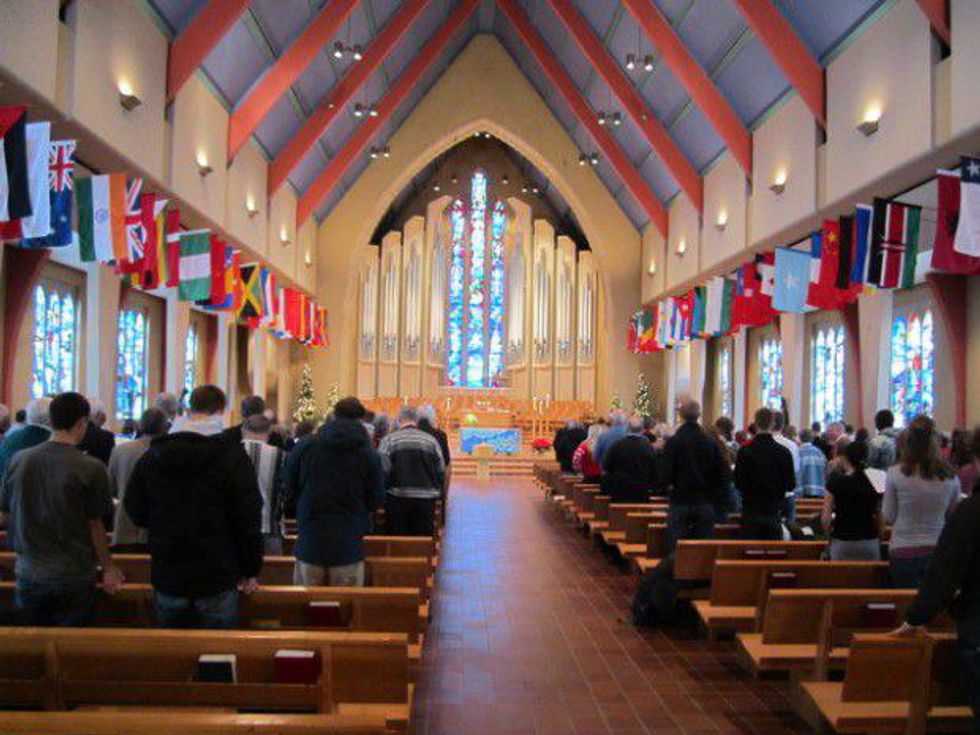The debate on the Biblical and Theological Studies- Bible (BTS-B) and Biblical and Theological Studies- Theology (BTS-T) General Education (GE) requirements is not new, but it is always lively.
I published an article in Manitou Messenger- Saint Olaf’s student newspaper- last week, but I believe the topic deserves more research and attention from writers and readers alike. There are things that are just there because nobody cares to change them, among which Saint Olaf’s religion requirement is a typical example.
By writing this article, I am not simply offering “food for thought”. I firmly believe that sooner or later, these thoughts will come true; that one day, Saint Olaf will end up choosing to add other religions than Christianity into its religion requirements.
1. For the sake of clarity
I would like to clarify that I am not attacking the BTS-B and BTS-T themselves.
Personally, these classes have been one of the most meaningful experiences I have had at St. Olaf so far. Thanks to the openness of the college community and especially the Religion Department, I, a Vietnamese international student with no Christian background, have a chance to glance at the belief of my fellow domestic students, and at the same time to be able to offer my own viewpoint on the Bible.
In a larger scale, I admit that there are abundant positive responses on these courses from both domestic and international students.
What I would like to discuss here is the domination of Christianity in St. Olaf’s religion GE requirement. My argument is that this domination is subject to the College’s choice and no longer fits in its newly diverse campus. In this article, I will go through two main objections to this argument and provide my reply to each of them.
2. Objection one: Christianity as the main factor in religion GE requirement is required in colleges affiliated with the Lutheran Church.
This assumption, despite being very common, is groundless.
St. Olaf is affiliated with the Lutheran Church through an association called ECLA (Evangelical Lutheran Church in America). As I talked to a Religion Professor at the College, this affiliation is much more historical and spiritual than financial, since the church does not make any considerable monetary contribution to the College.
Moreover, ECLA does not explicitly require any religion commitment in its colleges’ curriculum: when you skim over 26 ECLA colleges, 7 of them do not make Christianity and Bible studies the only subject for their religion requirements. These colleges include Finlandia University (MI), Gettysburg College (PA), Grand View University (IA), Midland University (NE), Muhlenberg College (PA), Roanoke College (VA), Susquehanna University (PA) and Wagner College (NY). That is to say, there is no commitment, either financially or administrative, bound on St. Olaf by its Lutheran Church association.
Not only the domination of Christianity in religion GE requirement but also the affiliation with the Lutheran Church is a choice made by the College. There is no legal binding for St. Olaf to stick to the Lutheran Church and in fact, many colleges have abandoned their religious tradition.
For instance, Ivy Leagues colleges like Harvard, Princeton, Yale and Dartmouth were established to train ministers of the gospel and to evangelize the Atlantic seaboard but have now (radically) turned secular. St. Olaf does not necessarily follow this path– it is both painful and time-consuming, but I would like to note that St. Olaf like it is now is the combination of what we chose in the past and what we are not choosing at the present.
3. Objection two: Christianity has been in our College for too long. Without making it a requirement, is St. Olaf losing its identity?
This objection is problematic varying on how the College’s identity is defined.
An opponent may say define St. Olaf identity as its philosophy of education.To be fair, Christianity has actually shaped the St. Olaf education. The College owes its origin to Christianity: it was established by Norwegians for their community whose religion is Christianity.
Since then, the dominating religion has benefited the community. In his essay The Lutheran tradition and the liberal arts college: how are they related?, Darrell Jodock has proved through Luther’s background and Lutheran theology that Lutheran values correspond and enhance many liberal arts philosophies. A college related to the Lutheran tradition exhibits the following five interlocking characteristics:
"1. It serves the community and educates community leaders.
2. It strives for academic excellence.
3. It honors freedom of inquiry.
4. It embraces the ideal of the liberal arts.
5. It organizes itself as a community of discourse.”
With the particular openness of Lutheranism, under Lutheran influence, Saint Olaf has always been an open community ever since the early days: “the teaching of Religion at St. Olaf was to be in the interests off nurture rather than conversion”, according to Shaw.
The St. Olaf community around mid-20th century “tried not to embarrass those who might be without faith” and the professors “made clear that the grade would be based on the demonstrated command of the assigned materials, not on one’s personal faith". And it can be clearly seen that this tradition continues until now. Since BTS-B and BTS-T represent all of the values below, they should be maintained.
The problem with this argument is that reading Bible is not the only way to exercise Lutheran philosophy. It is true that Luther read the Bible to liberate his mind, but requiring students to have the same experience 500 years later, when the world becomes more plural, is an out-of-context practice.
This argument also oversees the fact that the study of other religions can also nurture the same values and more, and the chance to explore these religions should not be reserved only for students majoring in religion.
Another opponent may identify St. Olaf by religion background of its student body. The fact that the College was immersed by Norwegian community with Christian background in the past is undeniable, but even now most of the student body is Christian. Therefore, BTS-B and BTS-T reflect the demand of this majority of students to deepen their faith, and international students like me may enjoy having a new taste of an alien religion.
This sounds too authoritarian for me, when administrations try to decide what is best for their students without asking the students themselves. If a poll is conducted, they would notice that there are more nuances in which religion courses the students would choose than a plain continuation of their own religion. A student who goes to a Catholic Church for their whole life may want to try Buddhism for the sake of exploration, for example.
Finally, somebody may say that St. Olaf needs to keep its heritage to remain as itself. I answer we are not getting rid of Bible study courses, but adding diverse religious experiences. I believe as St. Olaf diversifies its community, its curriculum also needs to undergo the same process: like an ocean, it should be open to flow and not get rid of any.
4. Conclusion
I have no religion. I write this article neither because I despise Christianity nor because I am desperate for another religion. What I am trying to emphasize is the ability to choose, so that the College looks more like a place for free adults.
A change can happen in different level: maybe as radical as to make both BTS-B and BTS-T optional among other choices or cut down the current religion requirement to only one BTS-B course. To whatever extent is the diversification, why it is still not happening? I honestly have no idea and would be grateful for any input on the matter.







 StableDiffusion
StableDiffusion StableDiffusion
StableDiffusion StableDiffusion
StableDiffusion Photo by
Photo by  Photo by
Photo by  Photo by
Photo by 
 Photo by
Photo by  Photo by
Photo by  Photo by
Photo by  Photo by
Photo by  Photo by
Photo by 











